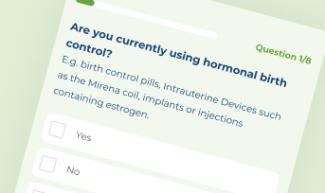
You may have heard of women having an ‘early menopause’ and wondered ‘how soon is early?’ Menopause (which is defined as when your periods have stopped for 12 months) usually happens around age 511, but when it happens much earlier, under age 45, it’s known as ‘early menopause.’ Read on to learn all about early menopause, why it happens, how early it can happen, and just how rare it is.
What is early menopause?
If a woman goes through menopause—and by that we mean she hasn’t had a period in over a year, and not just that she’s been having menopausal symptoms—between the ages of 40 and 45, this is referred to as ‘early menopause.’ It’s not as uncommon as you might think, with early menopause affecting approximately 5%, or 1 in 20 women2.
Why do some women have early menopause?
There is no clear reason why some women go through early menopause but a few factors are known to play a role in increasing the likelihood, including:
- Genetics - early menopause often runs in the family: If your mother or older sister has an early menopause, then you are more likely to have an early menopause. Certain genetic conditions such as galactosaemia, Turner’s syndrome and Fragile X premutation can also increase the likelihood2
- Smoking - studies have shown women who smoke tend to enter menopause at a younger age, perhaps due to the toxic effects of smoking on the ovarian follicles3
- Certain health conditions - these can include autoimmune diseases, HIV and AIDS, Down’s Syndrome, or chronic fatigue syndrome2
However, for the majority, (approximately 60%) of women who have early menopause4, the cause is unknown. This is known as idiopathic premature menopause.
Early menopause can also be a result of medical treatments for other issues affecting your hormones and reproductive organs. This can include2:
- Certain cancer treatments - chemotherapy or pelvic radiation treatments can damage your ovaries and cause your periods to stop
- Surgery to remove the ovaries or uterus
How is early menopause diagnosed?
If you have menopause symptoms or your periods have stopped for a long period of time before the age of 45, your healthcare professional should be able to diagnose your menopause status based on tests that check your hormone levels5 as well as your symptoms and any relevant family history.
Is there any treatment for early menopause?
Healthcare professionals commonly prescribe HRT (hormone replacement therapy) to help with missing hormones (primarily estrogen, and for those women with a uterus, progesterone also) and the menopause symptoms they can cause5. Often, healthcare professionals prescribe treatment at least until age 51y, which is the typical age of menopause, to help protect you from osteoporosis or other conditions that can develop after menopause. If you think you may be experiencing early menopause, speak to your healthcare professional who can recommend the best treatment options for you.

Is Clearblue® Menopause Stage Indicator right for me?
Take our simple quiz to find out!
Can early menopause happen if you’re under 40?
Yes. If you go through menopause under 40, this is called premature ovarian insufficiency (POI) or premature menopause. However, it’s incredibly rare, and affects fewer than 1% of women6. Premature ovarian insufficiency is the loss of ovarian function before age 40 and can have the same causes as early menopause5.
Sources :
- https://www.mayoclinic.org/diseases-conditions/menopause/symptoms-causes/syc20353397
- https://www.womenshealth.gov/menopause/early-or-premature-menopause
- https://www.ncbi.nlm.nih.gov/pmc/articles/PMC5888979/
- https://www.betterhealth.vic.gov.au/health/conditionsandtreatments/premature-and-early-menopause#causes-of-early-or-premature-menopause
- https://my.clevelandclinic.org/health/diseases/21138-premature-and-early-menopause
- https://www.ncbi.nlm.nih.gov/pmc/articles/PMC3634232/

Experiencing symptoms like period changes & hot flashes?
Clearblue® Menopause Stage Indicator with FREE-to-download app makes it easy to track your symptoms and helps you take control of your menopause journey



